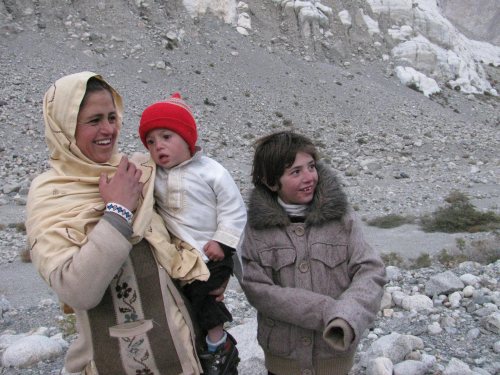Riding from Quetta to Multan
Posted in English, Pakistan on 11/16/2009 09:05 am by DaveAfter a long bus ride from the Iranian border to Quetta, we first took some days of in Quetta and got a feeling for the new culture. Also, we tried to get a permit to cycle to Multan. We went to the Home Department of the province, talked with them a few times, provided a detailed schedule and they told us that we are going to get a fax to our hotel. The fax never arrived. On the proposed day of our departure, the hotel owner simply called the police, asked for the required escort and of we went.
On our map were two roads, a red and a yellow one. We wanted to take the yellow one, less traffic is better, isn’t it?! Well, the first few kilometers of this wonderful yellow road turned out to be just an earth road. After that uphill, sometimes paved, most of the time gravel. Then the Diarrhea came. I continued cycling for the whole day, but definitly slower than my friends. The night in the police station of a little village. The next day is was not the only one sick. We hired a pick up truck the get to Ziarat, the next place with a hotel. The road was great, sad we could not cycle that part! Ziarat is a former British hill station, but there was not much except for that one teahouse that really reminded us of an English garden. Getting better, cooking on our own for some days. Then cycling on, always a motorbike with two policemen and a gun on it next to us. No traffic on roads with great scenery. Sleeping in police stations, cooking, cycling and some crazy interactions with locals. Also some very nice moments, I will remember the policeman who said: that over there is my house. It was lunchtime and so we got invited to eat there!
The ride ended with me and a friend being heavily sick again, so we decided to take a bus to Multan while the others cycled. They seated us in the back of this minibus. On the road were a lot of checkpoints, everytime we two had to get out, crawl over all the seats, write our names and passport numbers in a book and go on. These policemen on the countryside were mostly nice, but not really bright. Sometimes we had to explain that our visas are not expired. Was it the first passport they saw? But there were other names in the books before ours… The image that will stick in my head is a policemen sitting lazily on a plastic chair, holding a rope that replaced the boom barrier, stopping cars like that.
At dawn, shortly before D.G. Khan, at some checkpoint, the police took us out of the bus, with all our luggage. It needed a lot of protesting to get an explanation. D.G. Khan was supposely to unsafe for us, so they wanted to bring us directly to Multan. Well, that suited our plans well. We had to wait for the escort for some time. In the meantime, we got offered a shower at the police station , and even a hot one! What more can you wish?
The crazy thing with police escorts is that they are always only the police men from the current district. So at every district border a new escort is waiting. For the less-then-100km ride to Multan, we had to change the jeep three times. Always new policemen, always unloading the bicycles and all the bags und loading them again. They also have different police districts in the big cities. Cycling out of Quetta, we cycled next to four different jeeps. But I was positively surprised that we almost never had to wait for the next escort.
Read on for travellers: A recent thread on the Lonely Planet Forum about the same area.





 This lady was living in a small village, she had a garden, a simple house, two cows and seemed to be pretty happy. But I cannot really imagine where she could get the money for the school from. She herself had some education, about 10 years of school, but after that, her parents could not afford more school years for her next to the fact that she would have had to move to a city which is further away and which would take some money too, as there is no higher school nearby.
This lady was living in a small village, she had a garden, a simple house, two cows and seemed to be pretty happy. But I cannot really imagine where she could get the money for the school from. She herself had some education, about 10 years of school, but after that, her parents could not afford more school years for her next to the fact that she would have had to move to a city which is further away and which would take some money too, as there is no higher school nearby.


